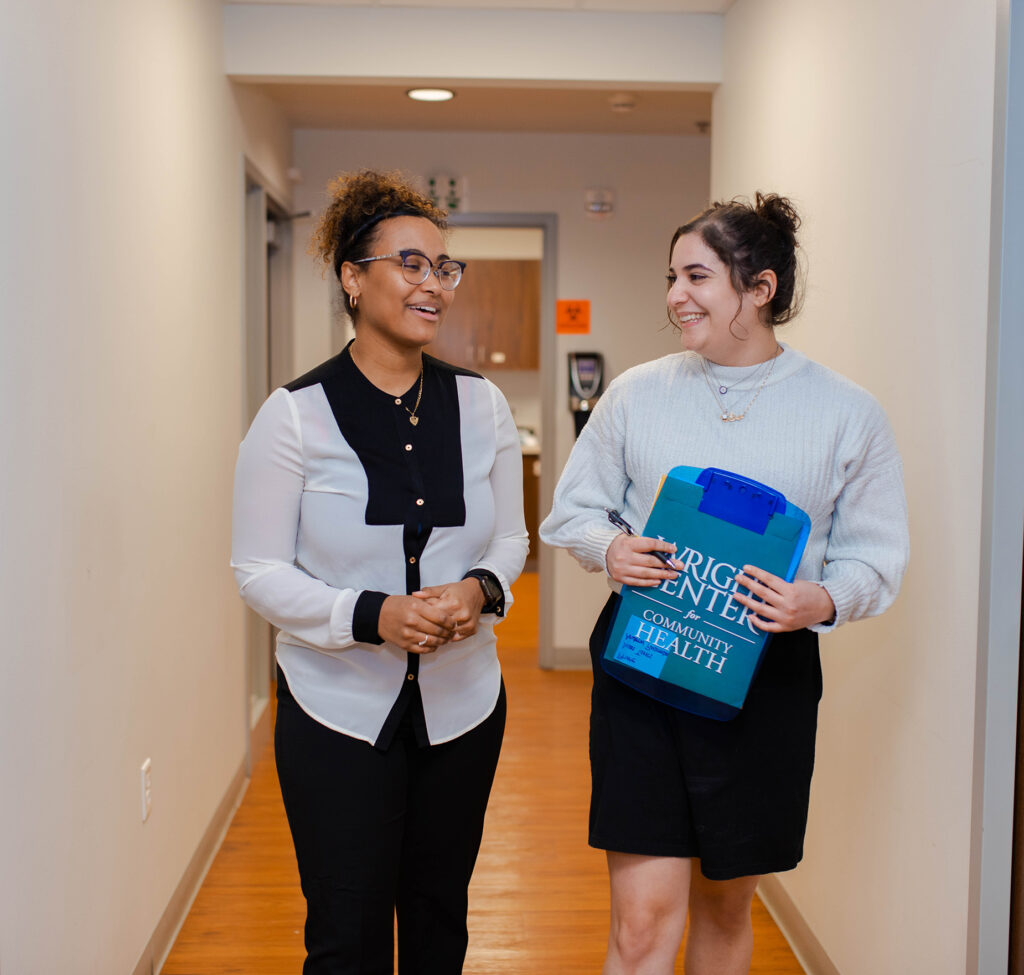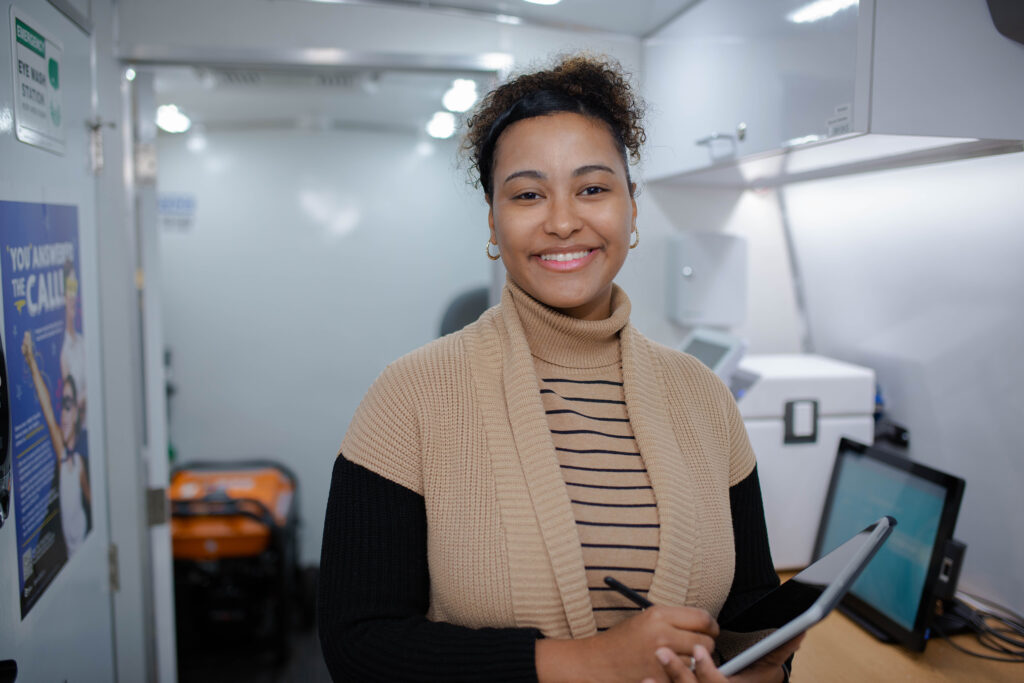News
Hazleton grad uses cultural savvy to improve health of community

As a community health worker, Scarlet Pujols Recio, who speaks both English and Spanish, helps to connect patients with the resources they need (such as housing, food, and transportation) to overcome their current challenges and improve their wellness. ‘People generally feel safe when they talk to me; they know I’m not going to judge them,’ she says.
The Wright Center for Community Health hosts Pujols Recio as she completes a program to become a certified community health worker – an in-demand occupation in U.S.
Dominican-born Scarlet Pujols Recio first showed signs that she was destined to work in health care at about 6 years old, using parts from an ink pen to pretend to give IV fluids to her Barbie doll.
Now 23, Pujols Recio remains driven to heal, but she has advanced from daydreaming about relieving people’s pain to actually working to improve the lives of Northeast Pennsylvania residents, including some of her Luzerne County neighbors.
The Hazleton Area High School graduate today serves with the AmeriCorps-funded National Health Corps (NHC) as a community health worker, or CHW, a role in which she improves access to health care by breaking down cultural and other common barriers.
She is based at The Wright Center for Community Health Scranton Practice, which currently serves as a host site for Pujols Recio and another AmeriCorps NHC member, 23-year-old Jullie Makhoul, as they complete a program that will prepare them to become certified CHWs.
The year-long program is part of the national response to the COVID-19 pandemic to boost America’s number of community health workers. It is administered locally through the Northeast Pennsylvania Area Health Education Center and made possible through the participation of the AmeriCorps NHC and Pennsylvania’s Commonwealth Civilian Coronavirus Corps, or CCCC.
Community health workers are a key part of today’s health care teams, because they help to bridge the gap between practitioners – including time-strapped doctors and nurses – and the patients most in need of assistance. CHWs act as patient advocates and are often deeply embedded members of the communities they serve, enabling them to quickly open lines of communication and build trust.
“People generally feel safe when they talk to me; they know I’m not going to judge them,” says Pujols Recio, who is fluent in both English and Spanish. “I’m here to help.”
Pujols Recio assists with language translation in The Wright Center’s primary care practices and aboard its mobile medical clinic improving not only the exchange of important information but also the quality of patient care.
She also aids patients as they navigate the process of signing up for health insurance or food assistance. And, much like a social worker, she devotes parts of each workday to connecting certain patients and their families to community organizations that offer hot meals, housing programs, and other services and resources they need to overcome their current challenges and improve their wellness.
“I didn’t know there were so many resources out there until I began my training at The Wright Center,” says Pujols Recio. She can now rattle off a list of area nonprofits ranging from A (Area Agency on Aging) to Z … or at least U (United Neighborhood Centers).
About once a week, Pujols Recio heads to a Luzerne County destination as part of a traveling Wright Center team that treats patients inside a mobile medical vehicle. The vehicle, known as Driving Better Health, reaches people close to where they live, learn, and work.
In Greater Hazleton, for example, stopovers for the vehicle have included the Dominican House of Hazleton, the Hazleton One Community Center, and public-school buildings. As Pujols Recio explains, it’s part of an effort to make sure people of all ages have access to COVID-19 vaccines and testing, and that school-age and other children are receiving their routine childhood immunizations to prevent polio, measles, and other diseases.
“Our Driving Better Health vehicle,” she says, “is having an impact everywhere we go.”

Jullie Makhoul, right, of Allentown, and Scarlet Pujols Recio, of Hazleton, are serving as AmeriCorps National Health Corps members in a program intended to boost the nation’s number of community health workers. Each received 75 hours of classroom instruction through the Northeast Pennsylvania Area Health Education Center and is now completing on-site work experience at the same host site, The Wright Center for Community Health Scranton Practice.
Demand soars for CHWs
The COVID-19 pandemic has increased both the visibility and the ranks of the nation’s community health workers. The role is one of the fast-growing occupations in today’s health care field, with a projected 12% increase in jobs between 2021 and 2031, according to the U.S. Bureau of Labor Statistics.
Community health workers typically need at least a high school diploma. The job is often viewed as a springboard to professional careers in medicine such as nursing. However, many people find their niche as CHWs, settling into the role because it suits their personalities and inner callings to serve.
“To do this job, you definitely should be a person who wants to make a positive change in the community and who cares about the suffering of other people,” says Pujols Recio. “You have to be patient. You have to have social skills.
“You also have to know your boundaries,” she adds, echoing the mantra of her supervisor at The Wright Center. “Boundaries are very important because you don’t want to enable your patients. You want to give them the resources so they can help themselves.”
Pujols Recio and her fellow AmeriCorps NHC member, Makhoul, formerly of Allentown, began learning the dos and don’ts of community health workers during the classroom portion of their training.
As participants in the Northeast Pennsylvania Area Health Education Center’s state-accredited program for CHWs, they were instructed on the core competencies of the job. Each woman completed 75 hours of class time, exploring topics such as chronic disease, preventive care, health literacy, and how to build and maintain relationships.
Each is now amassing the required 2,000 hours of on-site work experience required before an individual in Pennsylvania can apply to become a certified CHW.
Makhoul, who speaks Arabic, might stay at The Wright Center after completing her required hours in April, joining the organization for a while as a full-time, paid employee.
The recent college graduate is currently completing an online master of biomedical sciences degree, and she trained to become a community health worker, in part, to enhance her professional background before applying to medical school. The experience, says Makhoul, has allowed her to see “a different side of patients.”
As AmeriCorps members, the students receive a living stipend of $15 an hour while fulfilling the requirements of the CHW program. Participants also receive an educational award of more than $6,000 and, if needed, are eligible for food assistance, child care assistance, and access to medical, dental, and vision coverage.
The women stay in touch with other students from their respective CHW classroom cohorts who are located throughout the region at their assigned host sites. These medically minded students recently formed a book club. Their first selected reading, perhaps not surprisingly, is “Lifelines: A Doctor’s Journey in the Fight for Public Health.”
For Pujols Recio, serving as a CHW allows her to move in the direction of her ultimate career ambition while gaining some valuable health care experience. A 2022 graduate of Keystone College, she has a dual degree in general biology and pre-medicine/public health. Her long-held goal is to become a physician.
“I came to the U.S.,” she says, “knowing what I wanted to do.”
Her passionate pursuit
Pujols Recio, who is the daughter of Carlos D. Pujols Encarnacion and Maria M. Recio de Pujols, arrived in Northeast Pennsylvania at age 14, speaking almost no English. “When I first got here, I felt like I was thrown to the wolves,” she says. “All but one of my high school classes was taught in English. Even gym. Math class was the worst.”
She excelled in the classroom anyway, relying on the support of understanding teachers and fellow students who translated the lessons. At times in her formative years, she was thrust into the role of caregiver for relatives with health issues. Her family has dealt with financial hardships, she says, in some cases turning to community resources to get through lean times.

Scarlet Pujols Recio, 23, is gaining on-site work experience at The Wright Center for Community Health this year as she pursues certification as a community health worker – one of the most in-demand occupations in health care. The Hazleton Area High School graduate splits her time between The Wright Center’s primary care practices and its mobile medical vehicle, better known as Driving Better Health.
Her desire to enter the medical profession has only become more focused as a result of those experiences. Medicine is, after all, a career in which the goal is to cure and comfort.
In the pandemic’s early days, she says that she worked at a Hazleton nursing home as a certified nursing assistant who helped residents with bathing and other activities of daily living. The job could be both physically and emotionally challenging, she says.
But Pujols Recio sees her stints as a nursing assistant and as a community health worker – both of which provided one-on-one patient experiences – as important steps on her path to one day becoming a skilled, compassionate doctor.
“I’m going to be treating my patients, not a disease,” she says. “I’m going to be looking at the individual.”
Meanwhile, Pujols Recio continues to revel in the everyday successes of community health workers.
She recently received a call from a patient whom she had been assisting for several months, after first encountering him at an area food kitchen. During the call, the formerly homeless man excitedly told Pujols Recio it seemed as if an application for public housing that she helped him to submit was moving forward and he might soon have a consistent place to stay.
To her, it was a spirit-lifting affirmation of what she and her fellow CHWs are able to do. “The support that we’re providing as community health workers to our patients is working,” she says. “It’s working!”
Are you interested in becoming a community health worker? Learn about upcoming training opportunities offered in Northeast Pennsylvania by the Area Health Education Center and apply at www.pachw.org/education-training.








